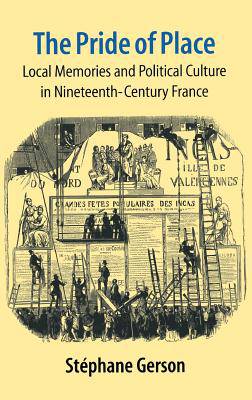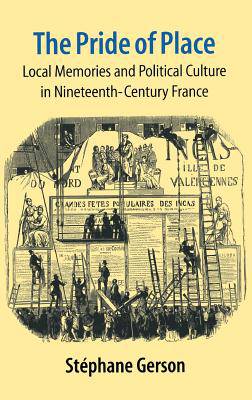
- Afhalen na 1 uur in een winkel met voorraad
- Gratis thuislevering in België vanaf € 30
- Ruim aanbod met 7 miljoen producten
- Afhalen na 1 uur in een winkel met voorraad
- Gratis thuislevering in België vanaf € 30
- Ruim aanbod met 7 miljoen producten
The Pride of Place
Local Memories and Political Culture in Modern France
Stephane GersonOmschrijving
Nineteenth-century France grew fascinated with the local past. Thousands of citizens embraced local archaeology, penned historical vignettes and monographs, staged historical pageants, and created museums and pantheons of celebrities. Stéphane Gerson's rich, elegantly written, and timely book provides the first cultural and political history of what contemporaries called the "cult of local memories," an unprecedented effort to resuscitate the past, instill affection for one's locality, and hence create a sense of place. A wide range of archival and printed sources (some of them untapped until now) inform the author's engaging portrait of a little-known realm of Parisian entrepreneurs and middling provincials, of obscure historians and intellectual luminaries. Arguing that the "local" and modernity were interlaced, rather than inimical, between the 1820s and 1890s, Gerson explores the diverse uses of local memories in modern France--from their theatricality and commercialization to their political and pedagogical applications. The Pride of Place shows that, contrary to our received ideas about French nationhood and centralism, the "local" buttressed the nation while seducing Parisian and local officials. The state cautiously supported the cult of local memories even as it sought to co-opt them and grappled with their cultural and political implications. The current enthusiasm for local memories, Gerson thus finds, is neither new nor a threat to Republican unity. More broadly yet, this book illuminates the predicament of countries that, like France, are now caught between supranational forces and a revival of local sentiments.
Specificaties
Betrokkenen
- Auteur(s):
- Uitgeverij:
Inhoud
- Aantal bladzijden:
- 344
- Taal:
- Engels
Eigenschappen
- Productcode (EAN):
- 9780801441349
- Verschijningsdatum:
- 28/08/2003
- Uitvoering:
- Hardcover
- Formaat:
- Genaaid
- Afmetingen:
- 162 mm x 240 mm
- Gewicht:
- 716 g

Alleen bij Standaard Boekhandel
Beoordelingen
We publiceren alleen reviews die voldoen aan de voorwaarden voor reviews. Bekijk onze voorwaarden voor reviews.











